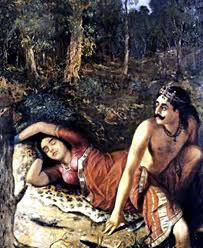Desire is the seed from which is born all activity, all happiness and all sorrows. Some make sacrifices to fulfill their desires; some make other people pay for fulfillment of their desires. Mahabharata is full of many characters of the latter category, with Satyavati (and her father) being the fountainhead.
Satyavati was the adopted daughter of the head of fisher-folks (Daashraaj). For mysterious reasons (that will be shared here one day), she smelt dreadfully of fish and was also known as Matsyaganda due to this unique quality.
Once, when Matsyagandha was ferrying across the river as a part of her professional routine, there came the Sage Parasara who wished to travel to the other side of the river. Sage Parasara, in the middle of the journey, felt the desire of making love to Matsyagandha and giving to the world a son from their unison.
Satyavati: I do not mind fulfilling the wish of a great sage like you, but please tell me Lord who will marry me after this one ‘day’ stand? I will no more be a virgin, will be tainted in the eyes of the society forever and no man would every marry me – they have anyway never wanted to, since I smell so dreadfully of a fish.
Sage Parasara: Do not worry lass! I am a sage of the highest order. Through the power of my tap I can do things that you cannot even think of. I will make love to you in open but no one will notice, you will become pregnant in an instant, give birth to a child in the next instant and then I will restore your virginity in the very next instant. Moreover, I will transform this smell of fish into the most irresistible feminine fragrance.
(Impossible it might seem, it could happen for he was sage Parasara – a descendant of his is today known as RAJNIKANTH)
Satyavati: So be it Sage! Wish of my Lord will be fulfilled.
Suddenly, a river of smoke enveloped the river of Ganga. The boat of Satyavati was anchored to an island, what was supposed to happen happened in the same order and in the same pace. By the time the river of smoke faded away, the fisher-woman Matsyagandha had transformed from a virgin to a lover to a mother back to a virgin, with a dark child in her hand (who also grew up to be the author of this epic). This child was named Krishna Dwaipayana (later to be known as Ved Vyas for compiling the vedas). Matsyagandha also stopped smelling of fish and developed a very attractive feminine fragrance.The son was born and the sage was gone, with his son, determined to make him one of the most learned men world would see.
After this episode, while on one hand Matsyagandha was glad to have served a sage and develop an irresistible fragrance which she knew could woo the men of strongest will power too, on the other hand she was consumed by guilt of entering into an amorous liaison before getting married. She went to her father and showed her hand to him pleading him to read and tell her future. Her father replied that she need not worry because despite what all happened, he could see that Satyavati was still destined to become a queen and be mother of sons who would be kings of a great empire. This revelation infused into the minds of both the father and the daughter the desire that one day they would be contributing to the royal bloodline.
In due course, they took strong steps to use this knowledge of future to assure that it happpened. But the morons only saw the future across one generation and not a couple more – for they would have realized that their these steps would bring a royal bloodline and along with it and entire nation to a standstill! The root of all human tragedy lies in the irrational human desire.
(All this happened long time before Shantanu’s son Devavrata had grown up. In fact, the episode of Parasara and Matsyagandha took place somewhere near the birth of Devavrata – as it is speculated that there was not much difference in the ages of Krishna Dwaipayana and Devavrata.)

